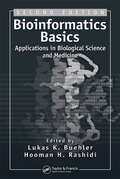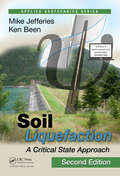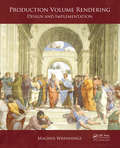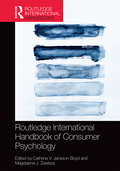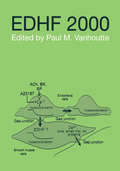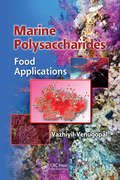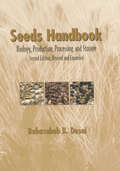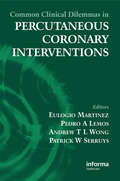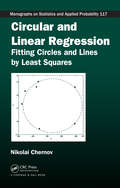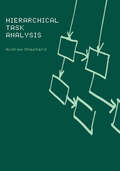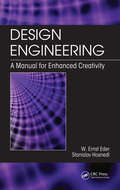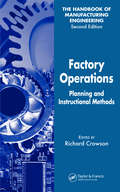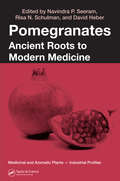- Table View
- List View
Powder Technology: Fundamentals of Particles, Powder Beds, and Particle Generation
by Hiroaki Masuda Ko Higashitani Hideto YoshidaDrawing from the third edition of the bestselling Powder Technology Handbook, this book is focused solely on analyzing the fundamental properties and behavior of particles and particle beds. Powder Technology:Fundamentals of Particles, Powder Beds, and Particle Generation concentrates on the most useful analytical methods of o
Wild Onion Nurse: A Collection of 25 Years of the Poetry of Nursing in a College of Medicine Literary Journal
by Judy SchaeferThe wild onion is an everyday plant, but rewardingly flavorsome and beautiful when closely examined - hence the choice of 'Wild Onions' as the title of the literary journal for and by Pennsylvania State University College of Medicine students, in which nurse and poet Judy Schaefer's work was first published in 1984. In the years since, Schaefer has become a key figure both as a nurse-poet in her own right, and in showcasing poetry and creative writing by other nurses, providing insights into the experience of delivering healthcare in a system burdened by cost and regulation. Here she selects a quarter of a century of her own poetry first published in 'Wild Onions', a collection which will be essential reading for nurses, students and researchers in the medical humanities, and all readers with an interest in poetry or healthcare.
Internet Guide to Anti-Aging and Longevity
by Elizabeth ConnorQuickly and easilyfind anti-aging and health strategies on the Internet Even the most sophisticated Web surfer can become frustrated searching for specific health information on the Internet. The Internet Guide to Anti-Aging and Longevity tackles this problem by providing a comprehensive compilation of annotated links on health,
Bioinformatics Basics: Applications in Biological Science and Medicine
by Lukas K. Buehler Hooman H. RashidiEvery researcher in genomics and proteomics now has access to public domain databases containing literally billions of data entries. However, without the right analytical tools, and an understanding of the biological significance of the data, cataloging and interpreting the molecular evolutionary processes buried in those databases is difficult, if
Soil Liquefaction: A Critical State Approach, Second Edition (Applied Geotechnics)
by Mike Jefferies Ken BeenA Rigorous and Definitive Guide to Soil LiquefactionSoil liquefaction occurs when soil loses much of its strength or stiffness for a time-usually a few minutes or less-and which may then cause structural failure, financial loss, and even death. It can occur during earthquakes, from static loading, or even from traffic-induced vibration. It occurs w
Production Volume Rendering: Design and Implementation
by Magnus WrenningeDue to limited publicly available software and lack of documentation, those involved with production volume rendering often have to start from scratch creating the necessary elements to make their system work. Production Volume Rendering: Design and Implementation provides the first full account of volume rendering techniques used for feature anima
Routledge International Handbook of Consumer Psychology (Routledge International Handbooks)
by Cathrine V. Jansson-Boyd Magdalena J. ZawiszaThis unique handbook maps the growing field of consumer psychology in its increasingly global context. With contributions from over 70 scholars across four continents, the book reflects the cross-cultural and multidisciplinary character of the field. Chapters relate the key consumer concepts to the progressive globalization of markets in which consumers act and consumption takes place.The book is divided into seven sections, offering a truly comprehensive reference work that covers: The historical foundations of the discipline and the rise of globalization The role of cognition and multisensory perception in consumers’ judgements The social self, identity and well-being, including their relation to advertising Social and cultural influences on consumption, including politics and religion Decision making, attitudes and behaviorally based research Sustainable consumption and the role of branding The particularities of online settings in framing and affecting behavior The Routledge International Handbook of Consumer Psychology will be essential reading for anyone interested in how the perceptions, feelings and values of consumers interact with the decisions they make in relation to products and services in a global context. It will also be key reading for students and researchers across psychology and marketing, as well as professionals interested in a deeper understanding of the field.
Edhf 2000
by Paul M. VanhoutteUnderstanding the nature and role of endothelium-derived hyperpolarizing factor appears to be crucial in the quest for improved treatments for hypertension, diabetes, ischemia-reperfusion and other vascular disorders.EDHF 2000 comprises the proceedings of the Third International Symposium on endothelium-dependent hyperpolarizations. The first t
Marine Polysaccharides: Food Applications
by Vazhiyil VenugopalIncreased public awareness of the importance of healthy living presents new challenges for the commercial food processing sector. The industry is always on the hunt for novel and safe additives with functional properties that can be used to impart healthy and appealing properties to foods. While the ocean is known as a conventional source of fish p
Integrated Water Resources Management, Institutions and Livelihoods under Stress: Bottom-up Perspectives from Zimbabwe; UNESCO-IHE PhD Thesis (IHE Delft PhD Thesis Series)
by Collin C. MabizaThe majority of people in Limpopo river basin depend on rainfed agriculture. Unfortunately the Limpopo is water scarce, and parts of the basin, such as Zimbabwe's Mzingwane catchment, are under stress in terms of agro-ecological and socio-politicoeconomic conditions. Integrated Water Resources Management (IWRM) has been adopted in the river basin i
Neuropeptides in Neuroprotection and Neuroregeneration
by Fred J. NybergAlthough the genomic era is no longer in its infancy, the life sciences are still facing questions about the role of endogenous proteins and peptides in homeostasis and pathologies. Delving into one of the most current fields of interest in biology and medicine, Neuropeptides in Neuroprotection and Neuroregeneration describes the impact of neuropep
Seeds Handbook: Processing And Storage
by Babasaheb B. DesaiRevised and expanded throughout, this latest edition of the bestselling Seeds Handbook: Biology, Production, Processing, and Storage includes valuable information on all areas of seed biology, production, and processing. The author, one of the most respected and prolific scientists in the field, identifies current developments in seed testing and c
Advances in Natural Medicines, Nutraceuticals and Neurocognition
by Con Stough Andrew ScholeyGreat strides have been made in the field of natural medicine with respect to neurocognition. Once limited to the province of niche publications, these discoveries are now routinely explored in mainstream psychopharmacology, neuroscience, nutrition, and medical journals. Now presented in one convenient volume, Advances in Natural Medicines, Nutrace
Common Clinical Dilemmas in Percutaneous Coronary Interventions
by Eulogio E Martinez Pedro A Lemos Andrew Tl Ong Patrick W SerruysCoronary stenting is the most commonly used method of myocardial revascularization, with approximately 2 million stents implanted in 2004 throughout the world. The development of drug eluting stents has resulted in very low rates of repeat intervention and will further increase the scope for percutaneous coronary intervention.The evidence from larg
Circular and Linear Regression: Fitting Circles and Lines by Least Squares (Chapman & Hall/CRC Monographs on Statistics and Applied Probability)
by Nikolai ChernovFind the right algorithm for your image processing applicationExploring the recent achievements that have occurred since the mid-1990s, Circular and Linear Regression: Fitting Circles and Lines by Least Squares explains how to use modern algorithms to fit geometric contours (circles and circular arcs) to observed data in image processing and comput
Particle Technology and Applications (Green Chemistry and Chemical Engineering)
by Sunggyu Lee Kimberly H. HenthornParticle Technology and Applications presents the theoretical and technological background of particle science and explores up-to-date applications of particle technologies in the chemical, petrochemical, energy, mechanical, and materials industries. It looks at the importance of particle science and technology in the development of efficient chemi
Hierarchial Task Analysis
by Andrew ShepherdHierarchical Task Analysis (HTA) is carried out by professionals who have to undertake a wide range of human factors and human resource design decisions. Using a wide range of industries and contexts to demonstrate the aplicability of HTA in various settings, the author has used straightforward and accessible case studies and examples for the reade
Green Syntheses, Volume 1
by Pietro Tundo John AndraosMany new methods directed to organic and inorganic syntheses of useful intermediates are being developed to specifically address green and sustainable chemistry principles. Highlighting the importance of green metrics, the Green Syntheses series focuses on how to reliably substantiate and validate the level of "greenness" of chemical processes, pro
Hydrocracking Science and Technology (Chemical Industries)
by Julius Scherzer A.J. GruiaPresents advances in the field of hydrocracking. The volume includes catalytic materials, reaction mechanisms and pathways, as well as hydrocracking processes and applications. It discusses hydrocracking processes and hydrocracking technology in catalytic dewaxing, resid upgrading, and fluid catalytic cracking feedstock improvement
Biomedical Applications of Mesoporous Ceramics: Drug Delivery, Smart Materials and Bone Tissue Engineering
by María Vallet-Regí Miguel Manzano García Montserrat ColillaDevelopments in mesoporous ceramics in drug delivery, nanomedicine, and bone tissue regeneration have opened promising developments in biomedical research, many applicable in the clinic in the near future. Due to the ability to fine-tune the physicochemical properties of these materials, the field has experienced an impressive burst in the number o
Data Analysis and Statistics for Geography, Environmental Science, and Engineering
by Miguel F. AcevedoProviding a solid foundation for twenty-first-century scientists and engineers, Data Analysis and Statistics for Geography, Environmental Science, and Engineering guides readers in learning quantitative methodology, including how to implement data analysis methods using open-source software. Given the importance of interdisciplinary work in sustain
Design Engineering: A Manual for Enhanced Creativity
by W. Ernst Eder Stanislav HosnedlAs with any art, science, or discipline, natural talent is only part of the equation. Consistent success stems from honing your skills, cultivating good techniques, and hard work. Design engineering, a field often considered an intuitive process not amenable to scientific investigation, is no exception. Providing descriptive theory, broad context,
Factory Operations: Planning and Instructional Methods (Handbook of Manufacturing Engineering, Second Edition)
by Richard CrowsonVolume two of the second edition of the comprehensive Handbook of Manufacturing Engineering illuminates the role of the manufacturing engineer as the key component of factory operation. The focus is on the planning and instruction duties that are critical to successful operations management, which fall upon the manufacturing engineer who may be unf
Pomegranates: Ancient Roots to Modern Medicine (Medicinal and Aromatic Plants - Industrial Profiles)
by Navindra P. Seeram Risa N. Schulman David HeberWhile one may not find ancient studies that substantiate the pomegranate's curative and preventive qualities, the exalted status of this fruit goes back as far as the history of agriculture itself. Allusions to the pomegranate are readily found in the oldest cultures of the Indus Valley, ancient China, and classical Greece, as well as in the Old Te
Psychotropic Bacteria in FoodsDisease and Spoilage
by Allen A. KraftPsychrotrophic Bacteria in Foods: Disease and Spoilage presents a comprehensive review of psychrotrophic bacteria and other pathogens and their role in causing food spoilage in refrigerated and frozen foods. The book focuses on the growth, survival, and subsequent activity of these organisms, especially in meat and poultry products. Metabolic produ



